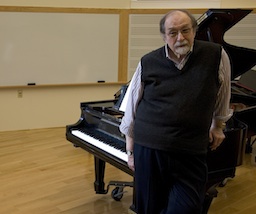Elliott S. Schwartz, Robert K. Beckwith Professor of Music Emeritus and renowned composer, died on December 7, 2016, in Brunswick, Maine.
(The following notice was shared by President Rose on December 8, 2016)
To the Bowdoin community,
I am very sorry to inform you of the death of Robert K. Beckwith Professor of Music Emeritus and renowned composer Elliott S. Schwartz in Brunswick on the evening of Wednesday, December 7. Elliott passed away after a prolonged battle with cancer that never dimmed his generous, optimistic, and creative spirit. He was eighty years of age. In a Facebook post on Thanksgiving Day, Elliott counted the blessings of family, his fifty-three-year marriage to his late wife, DeeDee, his former students and colleagues at Bowdoin, and his many friends among noted composers, musicians, and artists from around the world. He concluded the Facebook message with “No sad songs for me.”
Elliott was born in Brooklyn, New York, on January 19, 1936. He earned an AB in 1957, an AM in 1958, and an EdD in music composition and education in 1962, all from Columbia University. After four years as an instructor in music at the University of Massachusetts at Amherst, he joined the Bowdoin faculty as an assistant professor. He was promoted to associate professor in 1969 and to professor in 1965. In 1995 Elliott was appointed the first Robert K. Beckwith Professor of Music.
During his time at Bowdoin, Elliott was chair of the music department four times, for a total of twelve years. He was a pioneer of electronic music in America, and he was director of the Bowdoin Electronic Music Studio from 1970 to 1982. In 1968 and again in 1975, he was acting director of the Bowdoin Summer Music Festival. He held a position as distinguished university visiting professor at The Ohio State University (1985-86), and from 1988 to 1992 he also held a half-time professorship in composition at The Ohio State University School of Music. Other visiting appointments included Trinity College of Music, London (1967); the University of California–Santa Barbara (College of Creative Studies, 1970, 1973, and 1974); and the University of California–San Diego (Center for Music Experiment, 1978-79). He spent fall 1993 and spring 1999 terms at Cambridge University (UK) as holder of a visiting fellowship at Robinson College.
Elliott drew on many elements for his music, including fragments of autobiography and the sounds and sensations of lived experience. He had a penchant for thinking about music in “cinematic” ways, and he once said that he wanted “…to make the experience [of listening to his music] more like going to the films, to the theater, to the art gallery.” For Elliott, music was often about interpersonal ties. He wrote a number of pieces for and about good friends and colleagues.
Elliott was a prolific composer whose works were performed by chamber groups and orchestras around the world, and he was a guest composer/conductor/lecturer in the United Kingdom, France, Denmark, Italy, and Russia. By all accounts, he was a conductor’s and a musician’s composer, and he had a special gift for music that appealed to a broad audience. People appreciated in his compositions fragments of musical memory, dramatic tensions of juxtaposed elements, playful humor, and emotional responses that his music evoked. His prolific output ranged from Bowdoin-based “Elevator Music,” performed by musicians on each floor of Coles Tower (as the audience was conducted from floor to floor), to a McKim Fund commission for the Library of Congress, which was performed to celebrate the addition of Elliott’s papers to the Library of Congress. He was coeditor of the anthology Contemporary Composers on Contemporary Music, coauthor of Music Since 1945, and the author of Electronic Music: A Listener’s Guide, The Symphonies of Ralph Vaughan Williams, and Music: Ways of Listening. His essays and reviews appeared in Perspectives of New Music, The Musical Quarterly, Musical America, Music and Musicians (England), Nordic Sounds (Denmark), and other publications.
After his “retirement” in 2002, he took on a reduced teaching load to continue working with the talented students he had come to know; he stopped teaching in 2007. The creative spark remained as bright as ever, and Elliott’s actual retirement was a time for composition and performances of new works. Although he was unable to make a planned visit to New York this past September for an eightieth birthday concert of his works in the Thalia Theater at Symphony Space, he nevertheless saw and heard the entire program on Skype and was able to speak with numerous well-wishers during the intermission.
Elliot received many awards and critical acclaim for his work over the years. For all of his fame, however, he remained a warm and generous friend, a dedicated teacher, a lover of life and of good food (he was the restaurant critic for The Maine Times newspaper for many years), a strong supporter of the arts, and a devoted husband, father, and grandfather. He met his wife, Dorothy (DeeDee) Feldman, in high school, and they were married in 1960. No conversation with Elliott about his accomplishments went very far before he would begin talking about DeeDee’s extraordinary accomplishments as an artist, as executive director of the Maine Humanities Council, as the recipient of an honorary degree from Bowdoin in 2004, and as a wife, mother, and grandmother.
We celebrate Elliott’s extraordinary life and spirit with his son, Jonathan, his daughter, Nina Kahn ’88, and several grandchildren, and I know you join me in offering heartfelt condolences on behalf of a grateful College.
I encourage members of the Bowdoin community to read the many tributes to Elliott that will be appearing in print, on the Internet, and on social media to gain a sense of the breadth and depth of his contributions to music and to hear firsthand from the many former students, colleagues, musicians, composers, and friends whose lives he touched.
Sincerely,
Clayton

